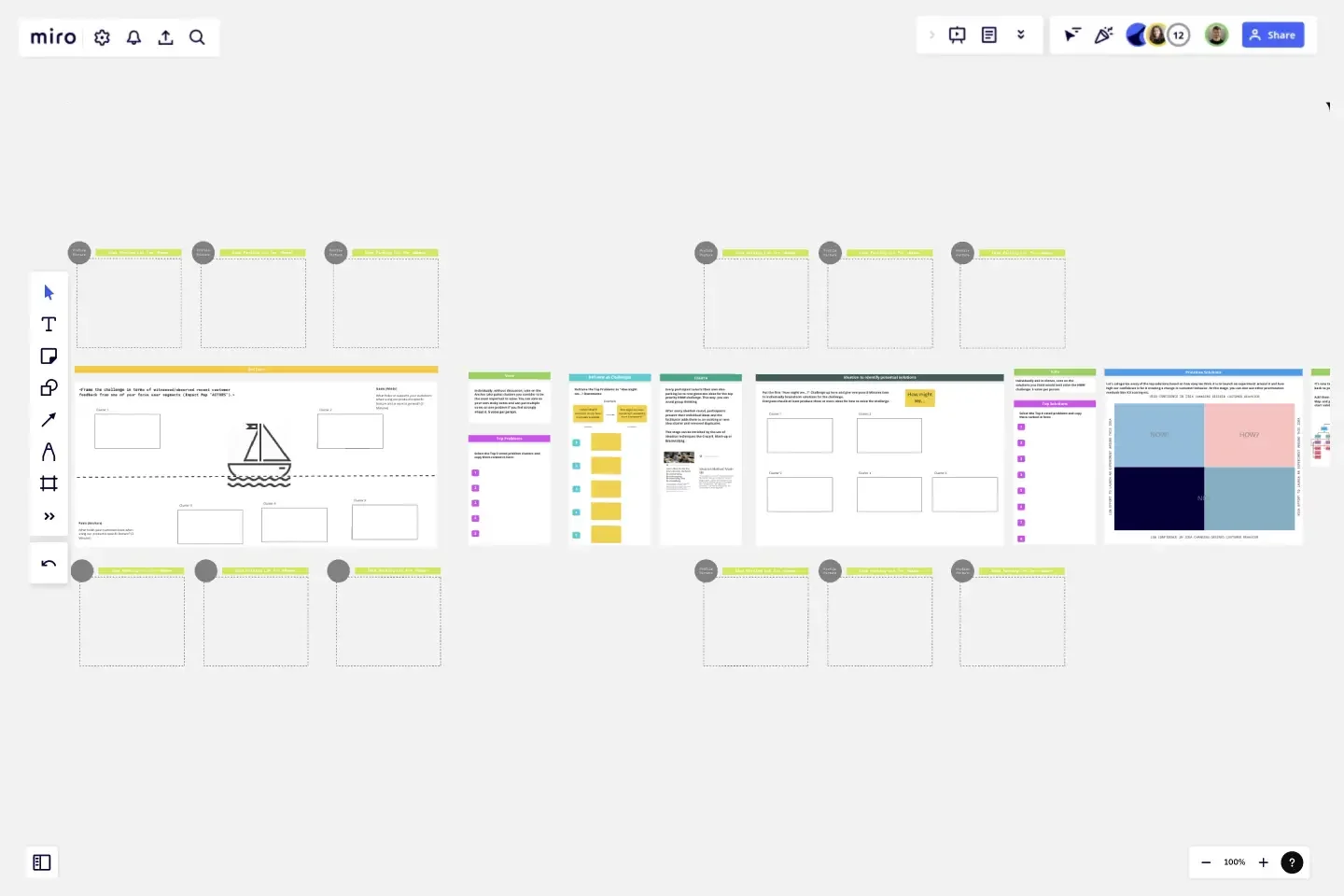Product Discovery Ideation Session
As part of Product Discovery, cross-functional product teams should be given the autonomy and freedom to explore the solution space on their own.
As part of Product Discovery, cross-functional product teams should be given the autonomy and freedom to explore the solution space on their own. Their complementary skills and perspectives lead to objectively better and more creative ideas than top-level management can come up with. But in order to harness this creativity, it takes structure. That's why I created this step-by-step ideation session template for teams to use during Product Discovery. I've incorporated proven ideas from my own experience and from others, while providing enough flexibility to make it your own.
For the "context" stage, I recommend frameworks like Impact Mapping, which can quickly bring participants up to speed in terms of recently gathered user insights. Throughout the ideation process, I encourage a "together alone" working mode, giving individuals the freedom to sort their thoughts without the bias and pressure of group thinking.
The session should end with a prioritization of the identified ideas. Here it's important to keep an iterative and experimental mindset for the following steps of your Product Discovery: Think how easy it would be to launch an experiment around this idea and how high your confidence is at the moment in terms of creating the changes in behavior you have prioritized.
This template was created by Tim Herbig.
Get started with this template right now.
Lean Coffee Template
Works best for:
Agile Methodology, Product Management, Meetings
What makes a great meeting (other than donuts)? It’s appreciating everyone’s skills, resources, and time by making the very best use of them. That’s what the Lean Coffee approach is designed to do. Great for team brainstorms and retrospectives, Lean Coffee breaks the meeting into three basic stages: what to discuss, what’s being discussed, and what’s been discussed. This template makes it easy for you to collect sticky notes and to update the columns as you go from topic to topic.
SIPOC Process Map
Works best for:
Agile Metodology
The SIPOC Process Map is a visual tool for documenting the high-level process flow of a system or project. It helps teams identify Suppliers, Inputs, Processes, Outputs, and Customers, facilitating a holistic understanding of the value stream. This template enables teams to visualize key process elements and interdependencies, empowering them to identify areas for improvement and optimize workflow efficiency. By promoting transparency and collaboration, the SIPOC Process Map empowers organizations to deliver value more effectively and satisfy customer needs.
STATIK Canvas
Works best for:
Agile, Kanban
STATIK Canvas template provides a structured framework for implementing Kanban methodology within teams. By focusing on understanding, shaping, and sharing knowledge, this template facilitates continuous improvement and alignment with organizational goals. Teams can visualize their workflow, identify improvement opportunities, and implement changes iteratively to achieve higher efficiency and effectiveness in their processes.
Daily Stand-up Meeting Template
Works best for:
Agile Methodology, Meetings, Software Development
The entire team meets to review the day before and discuss the day ahead. These daily meetings, also known as “scrums,” are brief but powerful — they identify roadblocks, give each team member a voice, foster collaboration, keep progress on track, and ultimately keep teams working together effectively. This template makes it so easy for you to plan daily standups for your sprint team. It all starts with picking a date and time, creating an agenda, and sticking with the same format throughout the sprint.
Penny Game
Works best for:
Agile
The Penny Game is a simulation exercise that illustrates the impact of batch size and work in progress on cycle time and throughput. By tracking the flow of pennies through a production system, teams learn how to identify bottlenecks, optimize processes, and improve efficiency. This template offers a practical way to explore Lean principles and drive continuous improvement, empowering teams to streamline their workflow and deliver value more predictably.
SaaS Implementation Timeline
Works best for:
Agile
The SaaS Implementation Timeline template offers a visual roadmap for planning and tracking the implementation of Software as a Service (SaaS) solutions. It provides a structured framework for defining milestones, allocating resources, and monitoring progress. This template enables organizations to manage SaaS deployments effectively, ensuring successful adoption and realization of business value. By promoting transparency and accountability, the SaaS Implementation Timeline empowers teams to deliver projects on time and within budget, driving organizational agility and competitiveness.
